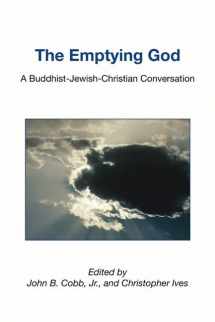
The Emptying God: A Buddhist-Jewish-Christian Conversation
Book details
Summary
Description
Masao Abe is widely acknowledged as a leader in the worldwide dialogue on Buddhism. A profound scholar of Buddhism and of Christian theology, his critical and constructive reflections culminate in the seminal essay that is the cornerstone of this volume. Seven eminent scholars respond to the challenge of Abe's construal of Kenotic God and Dynamic Sunyata" Abe demonstrates powerfully the dynamism of the Buddhist appreciation of the divine Emptiness at the heart of Being. His essay suggests how the doctrine of sunyata can provide a needed corrective to the reified understanding of God prominent in Jewish and Christian traditions. Abe opens the way for new and deeper engagement of these traditions with the wisdom of Buddhism. Leading Christian and Jewish theologians-Thomas J. J. Altizer, Eugene Borowitz, John B. Cobb, Jr, Catherine Keller, Schubert M. Ogden, Jurgen Moltmann, and David Tracy-respond to Abe's challenge. From perspectives as diverse as American feminism, post-Holocaust Judaism, process thought, and hermeneutics, they reply to Abe's proposals for considering God to be intrinsically self-emptying. Abe responds to these essays in a conclusion. Provocative and illuminating, The Emptying God shows how interfaith dialogue, at its very best, provides materials for the mutual transformation of all traditions.


We would LOVE it if you could help us and other readers by reviewing the book
Book review



